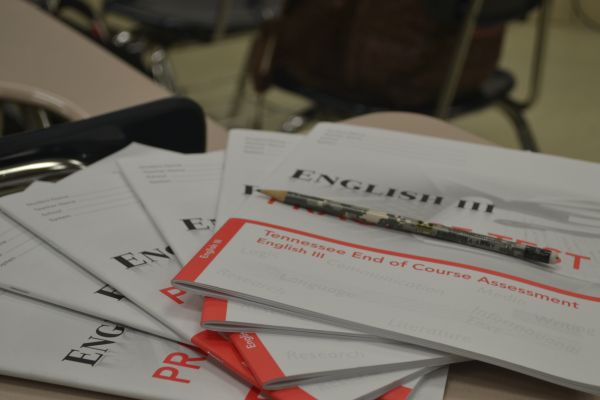Amount of Time Spent on Tennessee’s Standardized Testing Has Been Scaled Back for 2016-17
Parsons Feels the Reduced Time Does Little to Solve Testing Issues

STANDARD TESTS HAVE BEEN CONDENSED — The State Board has condensed the time and content of standard tests.
September 16, 2016
The Tennessee State Board of Education has announced that the amount of time spent on standardized testing will be condensed and shortened for the 2016-17 school year. This means that the EOC tests for the typical eleventh grader will be reduced by 225 minutes, or three hours and 45 minutes, compared to last year, and the test questions themselves will be condensed and more “rigorous” as the state board described.
Because of the EOC test’s increasing “rigorous” questions, Mr. Kevin Parsons, the test administrator for Central High School, expressed great concern for the students.
“The state board has said that the teachers will also be involved in the development of the test questions, but when?” canvassed Parsons. “The first quarter is quickly approaching us and I have yet to receive anything regarding teacher opinions on the test. Even if they were to send something out now, I can not change my teaching because it is too late to change anything. Everything for the year has been laid out already. How am I supposed to prepare my students for a test, whose components are unknown to me?”
Students have also started to voice their concerns for the EOC after hearing of the “condensed and rigorous” test this year.
“I think that the state board has made a bad decision, because a lot of students take the whole time to take the test and sometimes even need more time in order to complete the test,” explained Cheyenne Robinson, a sophomore student. “I am more concerned about the EOC now because the time has been shortened. I worry that I will not be able to completely answer all of the questions to their full potential.”
Parsons agrees that the process needs some adjustments to correct a variety of issues.
“The teachers do not agree with the rigor of the tests. Last year, in the English II EOC, the test included an excerpt from Frankenstein and another advanced book. Frankenstein is a great book, do not get me wrong, but I would not give the book to a tenth grader to read just because the difficulty of the book is too much for most to handle. The story itself is already advanced for the students, but to make the students formulate thoughts on an excerpt of the book — which is only a small paragraph from the book — without them knowing any background information on the story itself is already causing a problem for the students,” Parsons said. He added that the test does not take into consideration students who read a bit slower or have a bit more difficulty understanding texts which he believes is unfair because at that point the students only have no or little understand of the text and no background knowledge of the text.
“That was what happened with the test last year and now they say that they are going to increase the rigor of the test? This is not fair for the students. Their conditions and level are not taken into consideration in the making of the test,” he added.
Students that have been informed that the test will be condensed and more rigorous have also expressed great concern.
“When it comes to the ‘condensed’ part, I can not help but feel that I am not going to understand the questions as much as the previous test,” explained sophomore student Valeria Mazariegos. “It feels like the questions will be less elaborate.”
Part one of the EOCs has also been eliminated so the testing format will be similar to that of T-CAP, which is administered at one time at the end of the year. A field test for the English and U.S. History writing prompts will also be administrated in the spring of 2017.
“Concerning the elimination of part one of the EOCs and the addition of the field tests that will now be administered in the spring, there really is no difference at all now. Even though the field tests do not contribute to the students’ grades, it still does not change the fact the the students will still have to take a test in the spring that is EOC-related,” explained Parsons. “The only difference is that the results of the test do not contribute to the students’ grades, which leads us to another issue: How are we supposed to motivate students to take this field test seriously?”
Parsons said some students have already begun not to care about the EOC tests themselves due to the instability of the process of administering the tests and grading the tests, especially since no scores from last year’s EOCs have been reported by the state.
“Tests were administered so disorderly was last year; Central not only received the EOCs late, but we were also rushed to finish giving out the tests to the students,” he said.
Last school year, some of the tests were given out in two parts, early spring and in May. The state gave out a list saying what was going to be tested on each of the two parts of the test, yet when it came time to give out the first test, standards that were supposed to be tested on in the second part of the test were put in the first part of the test.
“At that point, many of the students lost faith in the standard tests. Not only has the state failed to grade the tests and give them out the anxious students, but they had also failed to test the right material for the students. For some students who express great concern for their grades, this may be increasing the stress levels of these students,
Even though last year’s tests were given in the early spring, scores from those tests still have not been reported by the state.
“Because of the chaos, the state decided those scores would not count, but we still took them but no results have been given if they have been graded,” he noted.
On a better note, the EOC can be taken either online or on paper for high schools. Although, the district will be deciding whether schools in Hamilton County will be taking the test on paper or online.
“Hamilton County is capable of testing all students online, so I feel like the test will most likely be given through a computer this year, but nothing has been finalized about this so I cannot say anything for sure. We also do not know, if we are taking the test through computers, which program will be used,” remarked Parsons. “I actually did not have an issue with the online test itself last year, it was well crafted, or programmed.”
Regarding the overall decision and wording of the state board, Parsons believes that the state is averting the attention of people.
“It feels as if the state is trying to deny where they went wrong with the standard tests; Everything that they have done concerning the standardized tests is only to make it easier for themselves, not much is made for the students. For example, one year, they literally just reused an old test that had questions that were not in the S.P.I.s of that year. Once the test was given, they just went back and omitted the questions that were not a part of the S.P.I.s,” he said, adding that he felt the state seems to be “sugar coating” everything and saying that “reducing” the test duration will solve all of the problems when in reality, that will not solve much.
Parsons said he did not want any misinterpretations that he is “anti-standardized testing” or anything of the like.
“It is not that I am against the standardized test or anything. In fact, I am actually in favor of the tests, it is just that the previous tests have just been terrible,” he clarified.
Questar, the company selected to provide the tests beginning this school year, is an assessment provider who has been operating for 40 years and has administed tests in Missouri and Indiana for a number of years.
“The education board has terminated the contract with the previous test provider, Measurement Inc., so hopefully the new test provider Questar will do a bit better at handing out the tests on time,” he added.




